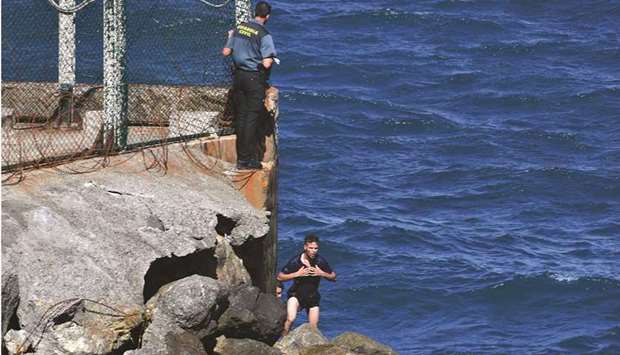Around 1,000 migrants, a third of them minors, reached Spain’s North African enclave of Ceuta yesterday, Spanish officials said, describing it as a “record” number in a single day.
The move comes at a point of diplomatic tension between Madrid and Rabat over the presence of a Western Sahara independence leader in Spain, which could affect the two countries’ joint efforts to battle illegal immigration.
A spokesman for the Spanish government delegation in Ceuta told AFP that the migrants had reached the enclave by swimming or walking at low tide from beaches in neighbouring Morocco.
Among them were 300 minors, he added.
Earlier, during the morning, the delegation put the number at 100 arrivals, saying that they were mostly young men but also included children and some women who had used inflatable swimming rings and rubber dinghies.
Others were able to almost walk there when the tide went out, the spokesman told AFP, with the numbers climbing rapidly throughout the day.
After being checked by the Red Cross, the migrants were taken to a migrant reception centre.
During the last weekend of April, around 100 migrants swam to Ceuta in groups of 20 to 30.
Most were deported back to Morocco.
Ceuta, together with Melilla – Spain’s other North African enclave – have the European Union’s only land borders with Africa, making them popular entry points for migrants seeking a better life in Europe.
Migrants try to reach the enclaves either by swimming along the coast or climbing the tall border fences that separate them from Morocco.
Figures published by Spain’s interior ministry show that between January 1 and May 15, 475 migrants reached Ceuta by land or sea, more than double the 203 that arrived in the same period last year.
The wave of migrant arrivals comes at a point of diplomatic tension between Madrid and Rabat after it emerged that Polisario Front leader Brahim Ghali arrived in northern Spain in mid-April and is being treated in hospital after being infected with the coronavirus (Covid-19).
The Polisario Front has long fought for the independence of Western Sahara from Morocco, and analysts have warned the spat could threaten bilateral co-operation between Madrid and Rabat in the fight against illegal immigration.

A Spanish Civil guard observes migrants who swam to the Spanish enclave of Ceuta from neighbouring Morocco.
